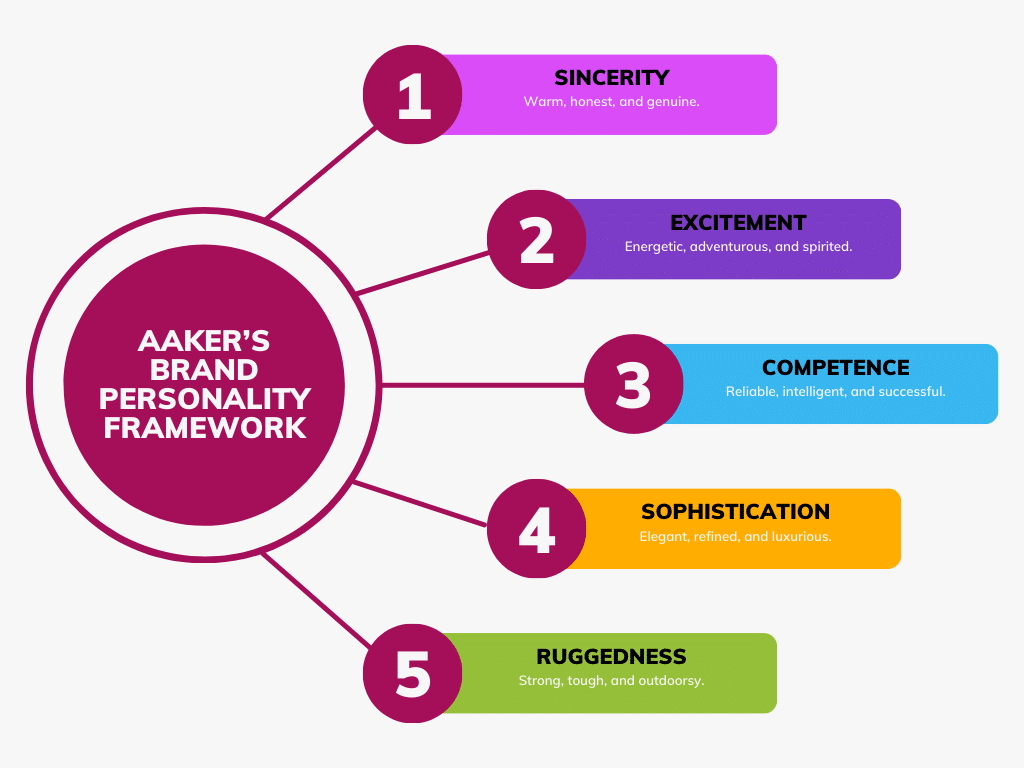Your brand needs a personality that packs a punch—something that grabs attention, sparks curiosity, and sticks in people’s minds.
A compelling brand personality draws people in and keeps them engaged. It’s the foundation of how you connect with your audience, influence perception, and build loyalty. In this blog, we’ll explore why having a strong brand personality is crucial, how it can shape consumer behaviour, and the steps you can take to showcase your brand’s unique traits effectively. By the end, you’ll understand how to make your brand memorable and cultivate deeper relationships that drive growth.
What Does Brand Personality Mean?
At its core, brand personality means giving your brand human traits—making it feel approachable and relatable. When your brand is consistent in showcasing these human characteristics, your audience will feel a deeper connection. People are naturally drawn to brands that feel like a reflection of themselves.
Why Brand Personality Matters for Your Marketing
Your brand’s personality shapes your marketing efforts, especially in these areas:
- Brand Choice: People tend to choose brands that resonate with their own values and lifestyle. A strong brand personality makes your brand name unforgettable and boosts brand loyalty by creating an emotional connection with your audience.
- Advertising: How you communicate says a lot about who you are. Your brand voice should be authentic, consistent, and clear. Establishing a solid brand style guide and brand guidelines ensures your messaging stays on point, helping to boost brand awareness and create a recognisable identity.
- Product Selection: A strong brand personality helps you stand out among similar products. It’s the “it” factor that makes people pick you over competitors. With a well-defined brand style guide, your brand’s unique traits shine through, making your product the obvious choice.
- Shopping Behaviour: Your brand personality can influence the entire shopping experience—making it memorable. Consistent brand guidelines create a cohesive shopping journey, which not only builds brand loyalty but also turns one-time shoppers into repeat customers.
People love brands that are consistent and easy to understand. When your brand values match what your audience cares about, you build a rock-solid foundation of trust that turns casual shoppers into die-hard fans.
Finding Your Brand's Unique Personality Traits
Forget the boring corporate fluff—let’s talk about your brand’s personality in a real, relatable way. Imagine you’re describing yourself to a friend. How do you want to come across?
Just like people, brands have different personalities, and your goal is to figure out what makes your brand distinct. Here are some questions and strategies to help you uncover your brand’s unique personality:
- What are your core values?
Think about what your brand stands for. Are you all about adventure, innovation, or maybe sincerity? Your core values are the foundation of your brand personality.
- Who is your audience?
- How do you want to be perceived?
- Look at competitors.
Analyse your competition. How do they present themselves? What are their strengths and weaknesses? Position your brand in a way that sets you apart—don’t just follow the crowd.
- Tell your story.
Craft a brand story that showcases your personality. Stories resonate with people on an emotional level, making your brand more relatable and memorable.
Finding your brand’s personality is about knowing your values, audience, and how you want to be perceived. By answering these questions, you can start to shape a brand personality that is authentic, relatable, and unforgettable.
Strong Brand Personality Drives Purchasing Behaviour
How does your brand’s personality make people want to buy from you? Let’s break it down:
- Emotional Connection
Consumers want to feel understood and valued. When they emotionally connect with a brand, they’re more likely to form a bond that drives loyalty. Tap into your audience’s emotions by aligning with their values and telling stories that resonate—this connection can inspire them to choose your brand time and again.
- Impulse Buying
In today’s world, buying on impulse is easy and common. Brands that create excitement make these moments happen—people buy because it feels good, not because they need to.
- Stand Out from the Crowd
Not everyone wants to follow the crowd. Some consumers crave individuality, and they look for brands that help them stand out. If your brand can offer something unique, these trendsetters will become your biggest advocates.
- Social Influence
Sometimes, people buy because of social perks. They want to align with a brand that enhances their image or helps them fit in. When your brand exudes the right social vibe, you attract those who want that association.
Understanding how these elements influence purchasing behaviour can help you shape a brand personality that drives not just interest, but action—turning casual browsers into loyal buyers.
Dimensions of Brand Personality: The Aaker Model

The Five Key Brand Personality Traits
- Sincerity
This trait is about being genuine, warm, and down-to-earth. Sincere brands build trust with their audience by being honest and transparent, making them relatable and trustworthy.
- Excitement
Brands that embody excitement are daring, spirited, and playful. They use bold marketing and adventurous campaigns to create energy and thrill, drawing people in with a sense of fun.
- Competence
Competence is about reliability, capability, and expertise. Brands that demonstrate competence are seen as leaders, providing dependable solutions that make them the go-to choice in their field.
- Sophistication
Sophisticated brands exude elegance, charm, and luxury. They attract audiences looking for refinement and exclusivity, positioning themselves as high-class and aspirational.
- Ruggedness
Rugged brands are tough, strong, and outdoorsy. They resonate with people who value resilience, adventure, and the great outdoors, often appealing to those seeking freedom and exploration.
Understanding this brand personality framework helps you craft a brand personality that makes your brand relatable and engaging to your target audience.
Brand Personality Examples
Exciting, Bold, and Adventurous

Red Bull is all about creating thrilling experiences. With energetic marketing campaigns, extreme sports sponsorships, and a tone of voice that’s playful and daring, Red Bull targets those who live on the edge. They don’t just sell energy drinks; they sell an adrenaline-fueled lifestyle.
Dove
Honest, Real, and Trustworthy

Dove’s brand personality centres around honesty and authenticity. By focusing on real beauty and self-care, Dove resonates deeply with audiences who value sincerity and emotional connection. Campaigns like “Real Beauty” emphasise transparency and build trust, helping Dove stand out in the crowded beauty industry.
Reliable, Capable, and Professional

Microsoft’s brand is built on reliability and expertise. Seen as a leader in technology, Microsoft provides trustworthy solutions for both personal and professional needs. Their consistent and professional communications reinforce their image as a dependable partner in the tech space.
Chanel
Elegant, Classy, and Luxurious

Chanel is synonymous with high-end luxury and sophistication. Everything from product design to advertising speaks of elegance and exclusivity, appealing to those who aspire to a glamorous lifestyle. Chanel’s brand persona makes it an icon of timeless fashion and luxury.
Tough, Adventurous, and Resilient

Jeep’s brand embodies adventure and resilience. Their messaging speaks to those who value freedom and exploration, positioning Jeep as the go-to brand for rugged journeys. More than just vehicles, Jeep offers the promise of adventure, encouraging customers to embrace the great outdoors.
These examples show how a strong personality can differentiate a company from its competitors, create a distinct identity, and resonate deeply with consumers. By understanding these traits, you can find inspiration for how to position your own brand and make a lasting impact.
Understanding Brand Personality in Action
So, now that we’ve explored the key elements of brand personality, how do you put them to work for your brand? Here’s how to use these insights to shape your brand voice and strategy:
- Identify Your Core Traits: Choose the traits that align most closely with your brand’s mission and values. Are you sophisticated like Chanel, or are you rugged like Jeep?
- Craft Your Messaging: Use the identified traits to shape your brand’s messaging. Make sure your tone, language, and visuals reflect your chosen personality.
- Be Consistent: Consistency is key. Your brand personality should be evident in every interaction—whether through social media posts, advertising campaigns, or customer service. Consistency builds trust and helps make your brand memorable.
- Engage Emotionally: Remember, brand personality is all about making a connection. Use these traits to evoke emotions that resonate with your audience—whether that’s excitement, trust, or a sense of belonging.
These traits aren’t just labels—they’re tools you can use to craft a brand experience that stays in the minds of your audience. It’s time to lean into the traits that align with your brand, amplify your uniqueness, and truly make your mark in the market.
Ready to Elevate Your Brand?
Your brand personality is the secret sauce to scaling your business. Whether you’re spirited, imaginative, or sophisticated, it’s time to make these traits shine. At Spark, we help brands connect on a deeper level and build identities that truly resonate. Let’s work together to bring your brand to life and leave a lasting impression on your audience. Learn more.





